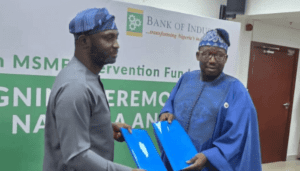World Bank approves $700m to build climate-resilient landscape in Nigeria
By Seun Ibiyemi
The World Bank has approved a 700 million dollar credit from its International Development Association (IDA) for the Nigeria Agro-Climatic Resilience in Semi-Arid Landscapes (ACReSAL) Project.
It said this in a statement issued in Washington on Thursday and made available to Nigerian NewsDirect.
According to the statement, the project will increase the implementation of sustainable landscape management practices in Northern Nigeria and strengthen the country’s long-term enabling environment for integrated climate-resilient landscape management.
It said that the productivity of major crops in Nigeria had been steadily declining over the past two decades, due partly to climate change, forcing an expansion of the area under agriculture and increased imports to meet the food needs of Nigeria’s growing population.
It added that persistent water shortages, especially in the extreme north, continue to exacerbate land degradation, desertification and habitat loss.
“Resource shortages, violent conflict, outdated agricultural systems not adapted to changing dryland conditions, lack of access to finance, weak value chain linkages, an uncompetitive environment for agribusiness, and poor market access are other key barriers to increased agricultural productivity in Nigeria.
“Better environmental and water resources management and resilience against disaster and climate risks (largely water-related) are needed to sustain economic growth and protect the most vulnerable.”
The bank, however, said that in recent years, the Federal Government had established several initiatives in the agriculture sector to combat desertification including afforestation and reforestation programmes.
Others are dissemination of proven agricultural technologies and sustainable agricultural practices and promotion of efficient energy sources.
It added that efforts to stop and reverse desertification were complicated by the need to feed a rapidly increasing population in a region where natural resources were dwindling and over 90 per cent of national food production depends on smallholder farmers who lack the capacity to increase food production without degrading land.
World Bank Country Director for Nigeria, Shubham Chaudhuri, said Nigeria is faced with water scarcity and droughts which occur every five years, on average, with the potential to increase in frequency due to climate change.
“This scenario not only threatens food security, livelihoods and productivity, but also exacerbates fragility and increases the risk of violence.
“With communities and households that are most dependent on natural resources for their survival and vulnerable to desertification, this intervention will improve multi-sectoral watershed planning and investments to help about 3.4 million direct beneficiaries adapt to evolving dryland conditions.”
ACReSAL Task Team Leader, Joy Agene, said that the project would specifically target the inclusion of vulnerable and marginalised groups, including women, youth and the elderly.
Others are persons with disabilities, internally displaced people and ethnic and religious minorities using an integrated watershed approach across sectors and levels of governance.
“This will help reduce the vulnerability of millions of the extreme poor in northern Nigeria, strengthening their own role in the management of their natural resources.
“It will also address land degradation, strengthen climate resilience, and lessen livelihood vulnerability in dry, semi-arid and dry sub-humid regions in the northern states.”
The ACReSAL Project is a six-year strategic project prioritising actions within four components.
They are Dryland Management, Community Climate Resilience, Institutional Strengthening and Project Management and Contingent Emergency Response.
The project is expected to improve the capacity of the country to adapt to a changing climate, largely through enhancing multi-sectoral convergence (across environment, agriculture and water) and technology modernisation, including improved use of data, analytics and connectivity.




